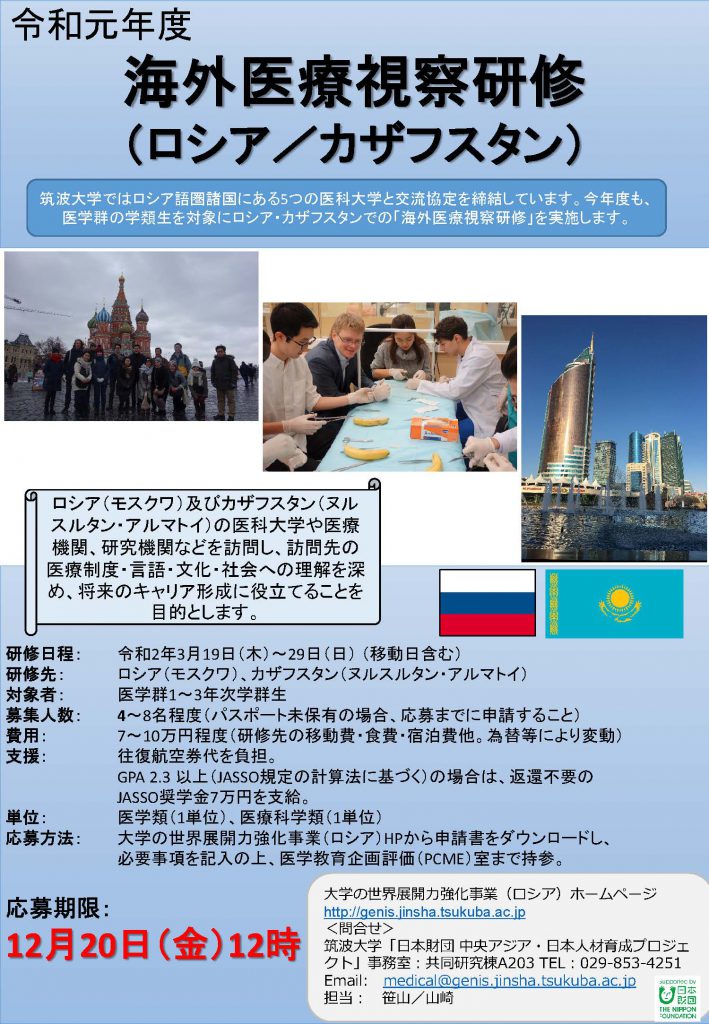
In March, “The Nippon Foundation Central Asia-Japan Human Resources Development Project” will conduct overseas medical study tour in Russia (Moscow) and Kazakhstan (Nur-Sultan and Almaty) for students in School of Medicine and Health Sciences.
Purpose of training:
The University of Tsukuba has concluded exchange agreements with five medical universities in Russian-speaking countries (Russia, Belarus and Kazakhstan). Last year, the Ministry of Education, Culture, Sports, Science and Technology conducted overseas medical study tour and overseas medical practice training as part of the “2014 Re-Inventing Japan Project (Russia)”. In the “Overseas Medical Study Tour”, we visited universities and medical facilities in Russia and Kazakhstan every year, but from this fiscal year 2019, we will conduct a study tour in Russia and Kazakhstan for undergraduate students of School of Medicine and Health Sciences, under the framework of the University of Tsukuba’s “The Nippon Foundation Central Asia-Japan Human Resource Development Project”, which was launched as a successor to the “Re-Inventing Japan Project”.
The aim of this project is to foster human resources who can contribute to the achievement of the Sustainable Development Goals (SDGs) and the resolution of local issues in central Asia by cooperating and cooperating with the Nippon Foundation, the Japan Central Asia Friendship Association, and the University of Tsukuba. One of the 17 goals of the SDGs includes “health care”, and cooperation in the fields of medical care and nursing is essential.
In recent years, Russian-speaking countries have also seen a rise in “medical tourism” to foreign countries in search of cutting-edge medical technology and high-quality medical care on the back of global trends. It is expected that University of Tsukuba will play an increasingly important role in the internationalization of Japanese medicine.
The purpose of this training is to visit medical universities, medical institutions, research institutes, etc. in Russia (Moscow) and Kazakhstan (Nur-Sultan, Almaty) to deepen the students’ understanding of the language, culture, society, and medical systems they visit, and to help them build their careers in the future.
Training schedule: Thursday, March 19, 2020 – Sunday, March 29, 2020
Training Country: Russia (Moscow), Kazakhstan (Nur-Sultan, Almaty)
Targets: 1st to 3rd year students in School of Medicine and Health Sciences
Number of applicants: about 4 to 8
Credit: College of Medicine “Outline for the International Project (Russian-speaking countries)” (1 credit)
College of Medical Sciences “Training Abroad on Medical Biology*” (1 unit)
Main training destination (scheduled):
・Russian National University of Research and Medicine (and medical facilities related to the university), Moscow National University (and medical facilities related to the university), etc.
・Al-Farabi Kazakh National University (and medical facilities related to the university), municipal hospital, Eurasian National University, National Center for Tumor Transplantation Science, etc.
Contents of training (scheduled):
・Participants will visit universities with which they have concluded exchange agreements, and make presentations and hold discussions with students from the same universities on issues in the medical fields of both countries.
・Participants will make a courtesy visit to the local Embassy of Japan to receive lectures on medical care in Russia and Kazakhstan.
・Visit hospitals, research institutes, medical institutions, etc. in Russia and Kazakhstan, and gain an insight about the medical situation in both countries.
・After returning to Japan, we will have a report meeting.
Cost: About 70,000 to 100,000 yen (varies depending on foreign exchange, such as travel, food, and accommodation expenses at training destination)
Support:
・Round-trip tickets will be paid.
・If you meet the requirements (GPA 2.3 or higher), you will receive a non-refundable Japan Student Services Organization (JASSO) scholarship (70,000 yen).
☆ To receive a scholarship, you need to submit other necessary documents.
☆ Calculated from the grades of the academic year 2018 (one year) for second-year and later group students, and from the grades of the spring semester (half-year) for first-year group students. Please calculate according to the formula specified by JASSO (described at the end of the guidelines).
Eligibility and Conditions
・In principle, a person who has Japanese nationality
・In principle, undergraduate students from 1st to 3rd year
・Those who can communicate in English (no problem of Russian ability)
・Who owns a valid passport during the travel period (or who can obtain it during December)
・Those who can register with the Overseas Travel Notification System and join the “Overseas Student Safety Management Assistance (OSSMA)” and overseas travel insurance in case of incidents, accidents, or disasters during their stay.
・Those who are able to submit a pledge with the approval of their guardian and supervisor (class teacher)
・Those who have a good understanding of the purpose of this program and the contents of their activities, and who can work in line with them
*Includes participation in pre-training and preparation (preparation of presentation materials at exchange meeting, etc.), submission of reports, and participation in report meeting.
How to apply: Download the application form from the link below, fill out the necessary information, and bring it to the Medical Education Planning and Evaluation (PCME) room.
Application Form
Application Guidelines
Application deadline: Friday, December 20, 2019, 17:00 (selection will be made in the case of a large number of applicants)
Result notification: by email, until Friday, December 27, 2019.
Inquiries
University of Tsukuba “The Nippon-Foundation Central Asia-Japan Human Resource Development Project (NipCA Project)” Office: Cooperative Research Building A203
TEL: 029-853-4251 / Email: info@genis.jinsha.tsukuba.ac.jp
Person in charge: Sasayama/Yamazaki
~ How to calculate the grade evaluation ~
・Calculated from the grades of the academic year 2018 (one year) for second-year and later group students, and from the grades of the spring semester (half-year) for first-year group students.
・Calculated by converting into “grading points” and applying the formula, referring to the table below.



